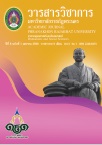การพัฒนาการท่องเที่ยวอย่างยั่งยืนของจังหวัดราชบุรี และสมุทรสงคราม
Keywords:
การท่องเที่ยว, การท่องเที่ยวอย่างยั่งยืนการพัฒนาการท่องเที่ยว, Tourism, Sustainable Tourism, Tourism DevelopmentAbstract
การวิจัยมีวัตถุประสงค์เพื่อ 1) ศึกษาการพัฒนาการท่องเที่ยวอย่างยั่งยืนของจังหวัดราชบุรี และจังหวัดสมุทรสงคราม 2) ศึกษาปัจจัยที่มีผลต่อการพัฒนาการท่องเที่ยวอย่างยั่งยืนของจังหวัดราชบุรี และสมุทรสงคราม และ 3) เสนอแนวทางการพัฒนาการท่องเที่ยวอย่างยั่งยืนของจังหวัดราชบุรี และสมุทรสงครามให้เหมาะสมยิ่งขึ้น การวิจัยนี้เป็นการวิจัยแบบผสานวิธี
ทั้งเชิงคุณภาพและเชิงปริมาณ การวิจัยเชิงคุณภาพดำเนินการโดยการสังเกตแบบมีส่วนร่วม และการสัมภาษณ์เชิงลึก ผู้ให้ข้อมุลสำคัญรวม 42 คน จากผู้ที่มีบทบาทสำคัญในการกำหนดทิศทางบริหารจัดการแหล่งท่องเที่ยวทั้ง หน่วยงานภาครัฐหน่วยงานเอกชนและกลุ่มองค์กรต่าง ๆ ภายในท้องถิ่น และผู้ประกอบการการท่องเที่ยวโดยเลือกแบบเจาะจงและวิเคราะห์ข้อมูลโดยการอุปมานวิเคราะห์ และการตีความสำหรับการวิจัยเชิงปริมาณดำเนินการโดยศึกษากลุ่มตัวอย่าง จำนวน 324 คน ประกอบด้วยผู้ประกอบการในแหล่งท่องเที่ยวพ่อค้าแม่ค้าพนักงานขับเรือและนักท่องเที่ยวชาวไทย อีกมาด้วยการเลือกแบบบังเอิญกำหนดขนาดกลุ่มตัวอย่าว โดยวิธีการกำหนดแบบไม่ทราบขนาดของกลุ่มประชุมกร ใช้สูตรของ Cochran เครื่องมือที่ใช้ในการวิจัยเป็นแบบสอบถาม วิเคราะห์ข้อมูลโดยใช้สถิติ ค่าร้อยละค่าเฉลี่ย ค่าส่วนเบี่ยงเบนมาตรฐาน และการวิเคราะหก์ารถดถอยแบบขั้นตอน ผลการศึกษาพบว่า 1) การพัฒนาการท่องเที่ยวอย่างยั่งยืนของจังหวัดราชบุรีและสมุทรสงคราม พบว่า โดยรวมอยู่ในระดับมาก ( = 3.65) เมื่อพิจารณาด้านพบว่า ปัจจัยด้านการสร้างและเผยแพร่ภาพลักษณ์ ( = 3.72) อยู่ในระดับสูงสุด รองลงมาคือ ปัจจัยด้านการพัฒนากลไกการบริหารจัดการ ( = 3.66) ปัจจัยด้านการพัฒนา โครงสร้างพื้นฐาน ( = 3.60) และปัจจัยด้านการพัฒนาคุณภาพสินค้าศักยภาพบุคลากรและการบริการด้านการท่องเที่ยว ( = 3.59) ตามลำดับ 2) ปัจจัยที่มีผลต่อการพัฒนาการท่องเที่ยวอย่างยั่งยืนของจังหวัดราชบุรี และจังหวัดสมุทรสงครามอย่างมีนัยสำคัญทางสถิติที่ระดับ 0.01 ประกอบด้วย 5 ตัวแปร ได้แก่การมีส่วนร่วมรับผลประโยชน์ความผูกพันต่อแหล่งท่องเที่ยว การมีส่วนร่วมในการติดตามประเมินผลการสร้างความยั่งยืนทางวัฒนธรรมและนโยบายการท่องเทึ่ยว (F = 137.590, p value = 0.000) ซึ่งปัจจัยทั้ง 5 ปัจจัย สามารถอธิบายความผันแปรของการพัฒนาการท่องเที่ยวอย่างยั่งยืนของจังหวัดราชบุรีและจังหวัดสมุทรสงครามได้ร้อยละ 70.20 (AdjustedR Square = 0.7020) 3) ข้อเสนอแนวทางการพัฒนาการท่องเที่ยวอย่างยั่งยืนของจังหวัดราชบุรีและสมุทรสงคราม ประกอบด้วยการปฏิบัติที่สำคัญ 8 ประการคือ (1) ส่งเสริมความร่วมมือของภาครัฐ ภาคเอกชน และชุมชนในลักษณะเครือข่ายเพื่อการกำหนดนโยบายรวมถึงการนำนโยบายไปปฏิบัติที่มีลักษณะรวมศูนย์ (2) บูรณาการด้านการรักษาความปลอดภัยในชีวิตและทรัพย์สินของนักท่องเที่ยว (3) ปรับปรุงกฎหมายที่เกี่ยวข้องกับการท่องเที่ยวให่สอดคล้องและอำนวยประสิทธิภาพต่อการบริหารจัดการการท่องเที่ยว (4) ส่งเสริมการมีส่วนร่วมของชุมชนในการวางแผนร่วมกันเพื่อป้องกันความผิดพลาดในการบริหารจัดการการท่องเที่ยว (5) พัฒนาคุณภาพสินค้า ศักยภาพบุคลากร และการบริการด้านการท่องเที่ยวว (6) สร้างศักยภาพของแหล่งท่องเที่ยวอย่างยั่งยืนบนฐานวัฒนธรรม โดยมุ่งพัฒนาเอกลักษณ์ วัฒนธรรมชุมชนให้เป็นจุดเด่น (7) ปรับปรุงการส่วนร่วมในการรับผลประโยชน์ของประชาชน โดยเฉพาะอย่างยิ่งการมีส่วนร่วมในการรับผลประโยชน์ระยะยาวทางเศรษฐกิจ (8) อนุรักษ์สิ่งแวดล้อมตามธรรมชาติให้คงอยู่ โดยปรับปรุงสภาพพื้นที่ใหเ้หมาะสมกับการท่องเที่ยว สภาพภูมิทัศน์ในพื้นที่ไม่ถูกทำลายโดยนักท่องเที่ยว ตลอดจนการจัดการขยะมูลฝอยในบริเวณสถานที่ท่องเที่ยวเพื่อป้องกันปัญหาความเสื่อมโทรมของแหล่งท่องเที่ยว
The objectives of this study were to 1) study the sustainable tourism development of Ratchaburi and Samut Songkhram provinces 2) study the factor affecting the sustainable tourism development of Ratchaburi and Samut Songkhram provinces and 3) propose the guidelines for the sustainable tourism development of Ratchaburi and Samut Songkhram provinces. This research was conducted by using mixed methods which combined the qualitative and quantitative researches. The qualitative research was conducted by participatory observation and in-depth interviewing of 42 key informants who were the key roles participants that determined the direction of tourism management in the public sector, private sector and other groups of locals and the tourism entrepreneurs selected by purposive sampling. The data were analyzed by analytic induction and interpretation. The quantitative research was conducted by the samples of 324 respondents comprising the entrepreneurs of tour sites, retail sellers, boat drivers and Thai tourists who were selected by accidental sampling. The sample size was obtained by the method of unidentified size of population of Cochran’s formula. The tool for data collection was rating scale questionnaire and data were analyzed by percentage, mean, standard deviation and stepwise regression
The research findings were as follows: 1) The sustainable tourism development of Ratchaburi and Samut Songkhram provinces in overall was at the high level ( = 3.65), the highest mean was the aspect of image creation and promotion ( = 3.72), followed by the aspect of development of management mechanism ( = 3.66), the aspect of development of infrastructure ( = 3.60) and the aspect of development of the quality of products, potential and travel services ( = 3.59), respectively. 2) The factors affecting the sustainable tourism development in Ratchaburi and Samut Songkhram provinces at significant of 0.01 level consisted of 5 variables, the benefit receiving, the tourist attractions engagement, the evaluation participation, the cultural sustainability and the tourism policy (F = 137.590, p value = 0.000). These 5 variables could explain the variation of the sustainable tourist development of Ratchaburi and Samut Songkhram provinces by 70.20 percent (Adjusted R Square = 0.7020). 3) The proposed guidelines for the sustainable tourism development of Ratchaburi and Samut Songkhram provinces consisted of 8 aspects. (1) promoting the cooperation of public
sector, the private sector and the community
to define policies including operational planning
(2) integrating the security for life and property
of travelers (3) improving the laws related to
traveling and facilitate effective management
of tourism (4) promoting the community
participation in the planning together to
prevent mistakes in the tourism management (5)
developing the quality of products, potential and
travel services (6) strengthening the capacity
of tourist site sustainable on base culture (7)
improving the participation of beneficiaries of
the people especially in the long-term economic
benefit (8) conserving the natural environment,
remain by improving conditions of the area,
suitable for tourism, the landscape in the area
were not destroyed by tourists as well as waste
management in area attraction to prevent the
problems of tourist attractions decadence.
Downloads
How to Cite
Issue
Section
License
"บทความวิชาการในวารสารฉบับนี้ ถือเป็นความรับผิดชอบของผู้เขียนเท่านั้น"
สงวนลิขสิทธิ์ตามพระราชบัญญัติลิขสิทธิ์




